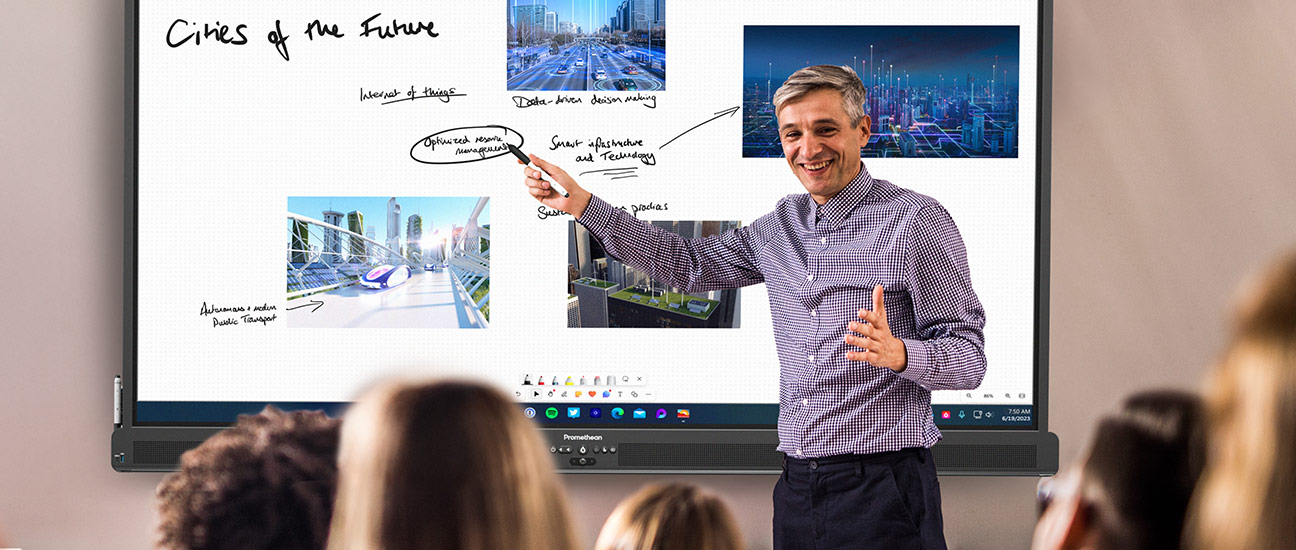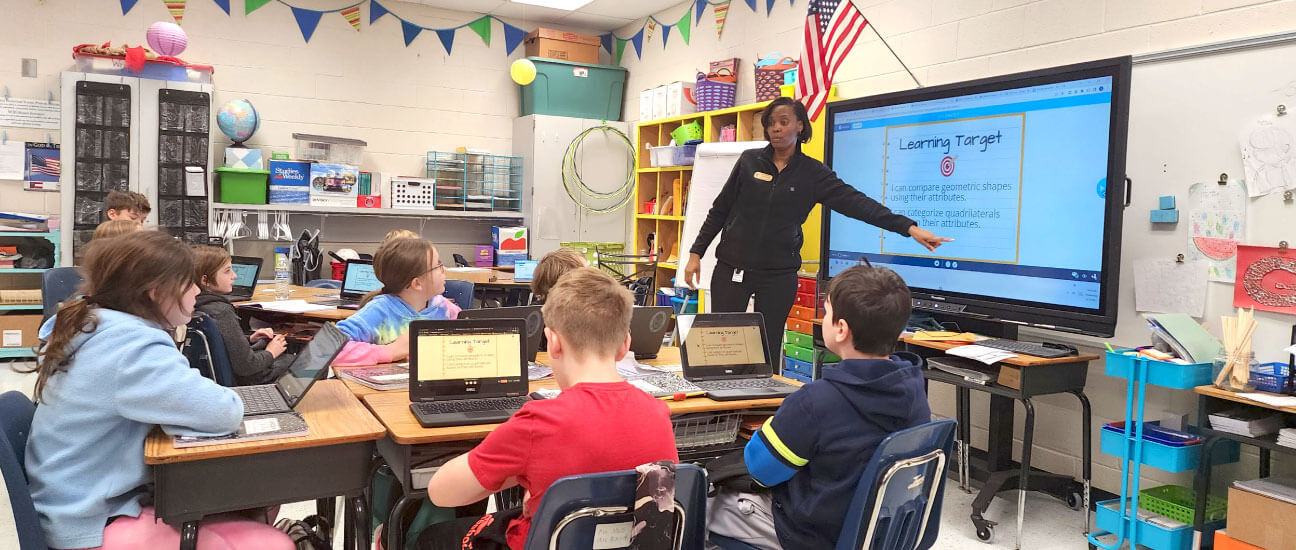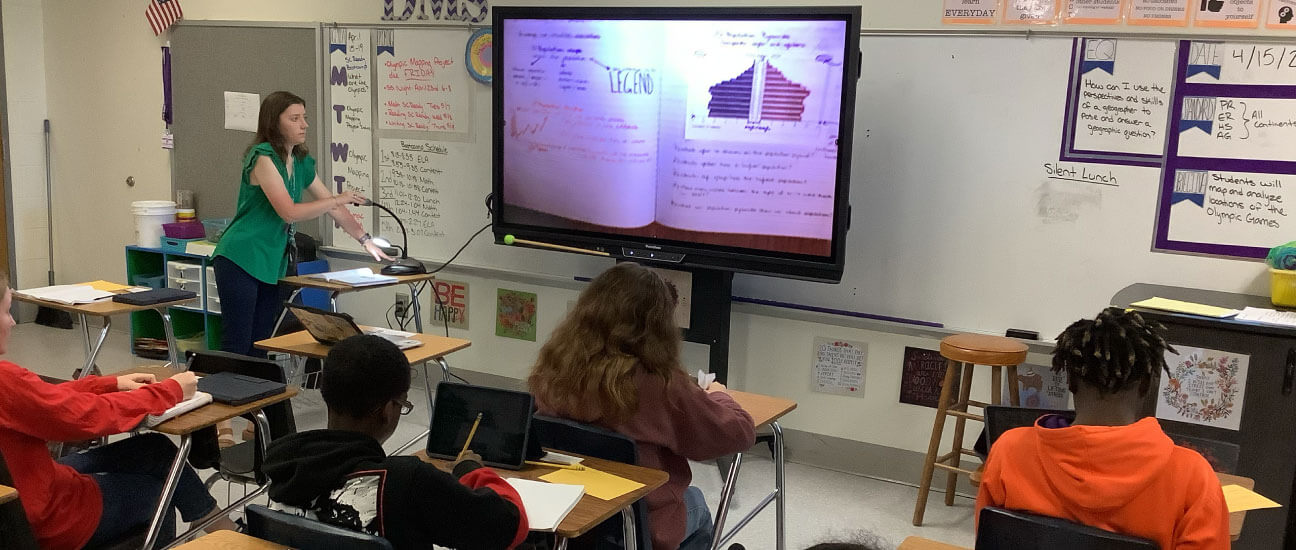Published on June 30th, 2023
Anguilla public schools overcome challenges with resilience, passion, and innovation
13 minute read
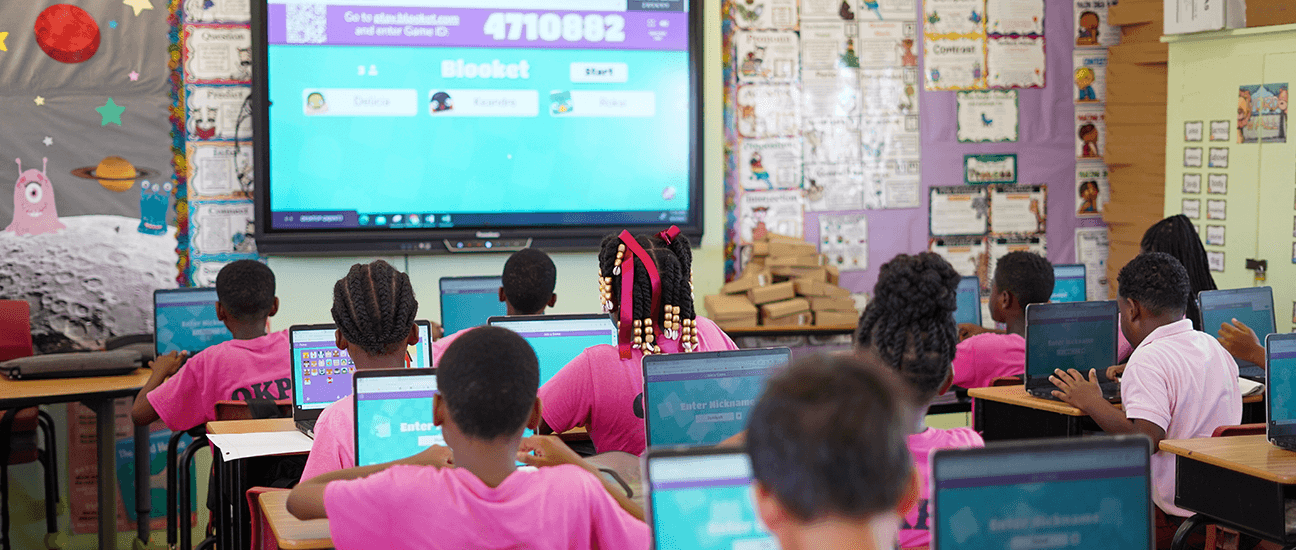
Surrounded by turquoise water, the spectacular eastern Caribbean island of Anguilla is 16 miles long, three and a half miles wide, and home to 33 white sand beaches. A British overseas territory, Anguilla’s tourism-based economy supports a population of more than 15,000, including 2,500 school-aged children. The island has a strong education program and highly skilled educators, many with advanced and graduate degrees. But in the last several years, Anguilla’s schools have faced a string of serious challenges.
In 2017, Hurricane Irma caused devastating, widespread destruction. The island’s single source of power was knocked out for more than six months. Of the many buildings that were leveled, two of Anguilla’s seven public schools were completely destroyed and another three had damage to over fifty percent of their facilities rendering them largely unusable. While students were back to school within a month of the storm, classes were held without electricity, and many were conducted in temporary spaces.
Then, before Anguilla had fully recovered from the hurricane, the pandemic swept the globe, causing the government to quickly shut its ports to travelers. This prevented a significant outbreak of COVID-19 on the island, but Anguilla’s tourism economy suffered. And while schools could remain open, students still lacked the technology they needed to thrive.
The department of education had tried integrating technology in the past, but the efforts were fragmented and ad hoc. “Every time it was one-off deployments of a few projectors, a provision of a few laptops—maybe two for a school of 30 teachers,” said Bren Romney, chief education officer. “It was touch and go with the initiatives.” Anguilla needed help designing an edtech roadmap that would allow it to bring its education program into the 21st century.
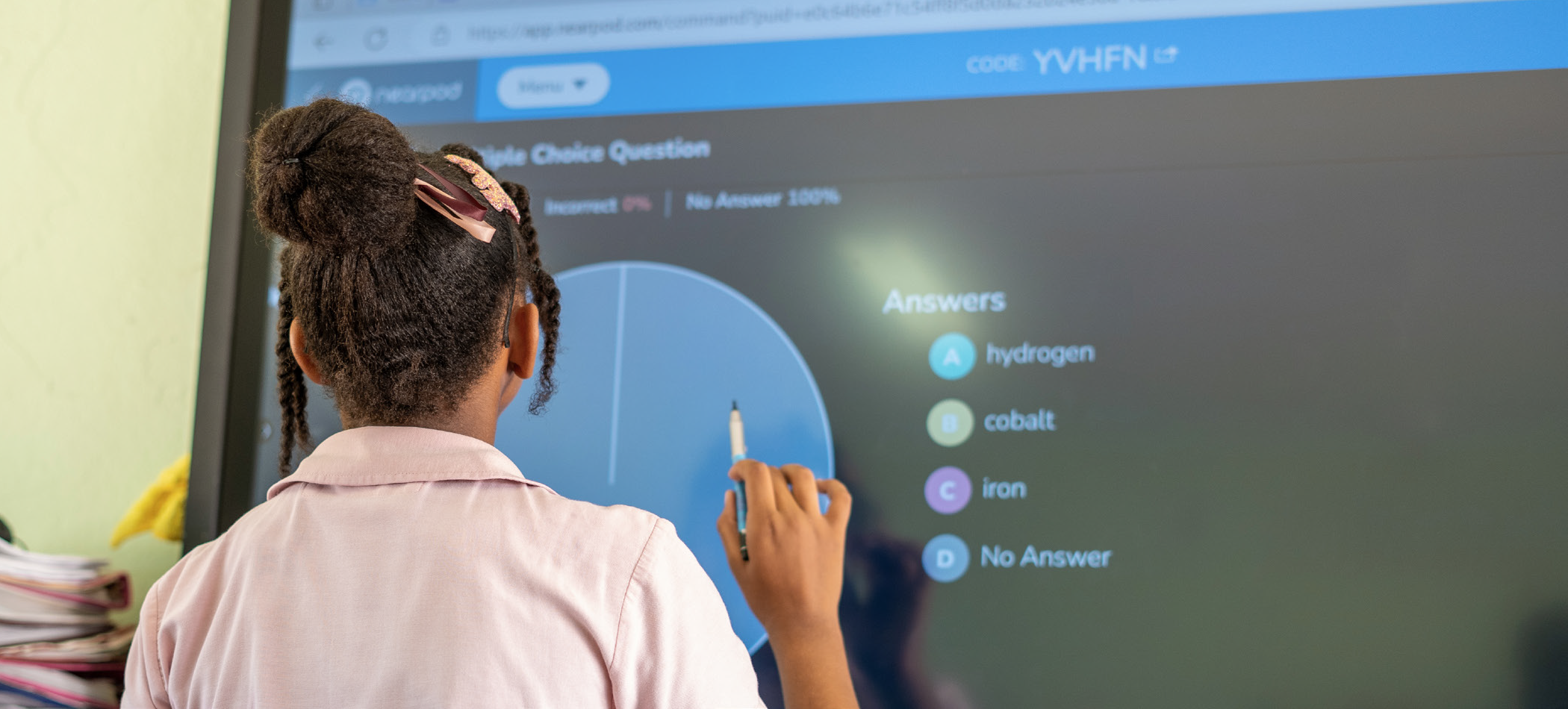
Philanthropist spearheads a strategic technology integration plan
Andy Hunn, a Virginia-based technology entrepreneur, had been a frequent visitor to Anguilla for many years. “It’s incredibly beautiful, peaceful, and tranquil—and the people are unbelievable,” marveled Hunn. In response to the devastation wrought by Hurricane Irma, Hunn was determined to help rebuild the island he’d grown to love. So he and several associates founded the Anguilla Initiative (TAI), a nonprofit supporting health, education, and well-being.
During the COVID-19 shut down, Hunn saw the positive effects one-to-one devices and interactive panels had in his children’s school in Virginia. He believed that with the right plan, technology could improve the learning experience on Anguilla, too. “It felt like a tractable problem,” Hunn said. “How could we put together an e-learning infrastructure that would encompass not just buying a bunch of devices and Promethean boards, but also the underlying supporting infrastructure?”
Through a partnership between the Anguilla government, the department of education, and TAI and its generous donors, Project INSPIRE (Integrating Next-generation Solutions to Power Innovative, Resilient Education) was created to help transform Anguilla’s educational system by implementing technology in its schools. “Project INSPIRE helped provide the wherewithal to be successful,” said Romney. “Creating a road map to integrate technology—and follow up with the procurement of that technology—made what was a dream a reality.”
Technology ignites a passion for learning and teaching
Ahead of the 2022-2023 year, Orealia Kelly Primary School (OKPS) was selected to be the first school to receive electrical and wireless upgrades, Lenovo devices for all students and teachers, an ActivPanel for every classroom, and two weeks of teacher training. “It was intensive, but it was also greeted with enthusiasm,” said Romney. “Teachers felt empowered and ready to get things off the ground.”
The technology transformation sparked new enthusiasm at OKPS, and students are eager to share what excites them about going to school. Shae Wills, a fifth-grade student, put it simply: “Classes are more fun.” Some of the things he and his classmates enjoy most are games, team quizzes, and the ability to share and show their work. They expressed how much easier and interactive learning is now.
Students are engaged so fully they almost forget they’re in school.
The excitement the technology generates in the first five minutes of the lesson lasts throughout the lesson
Bren Romney
He sees students taking a more empowered, active role in learning, which has led to peer-to-peer mentorship. “Students are in the driver’s seat, directing their peers,” said Romney. “By students teaching, they’re reinforcing the content for themselves, and motivating others to jump up to the board and take the lead. It’s more student-centered, which is superb.”
Educators feel the benefits, too. Resources like lesson templates simplify daily planning, allowing them more time to thoughtfully adapt lessons. “Teachers enjoy the fact that there’s something that assists them with teaching, presenting their work, differentiated instruction,” said Krystie Permuy, a sixth-grade teacher. “As a result, teaching has become more fun, easier, more enjoyable.”
Edtech aids differentiated learning and accessibility
Access to technology is supporting students’ unique learning styles and helping those who struggle in certain areas. “It’s easier to see the board when watching a video,” said Mordecai Connor, a third-grade student. “On the projector, it’s hard for me to see, but on the panel, it’s easier.” Other students shared that as visual learners, they learn better now that their teachers can show pictures on the panel to illustrate a topic.
Teachers are able to provide more specialized help when students need it, too.
We see change in a lot of students, especially those who were struggling
Shanelle Hodge Charles
“It has significantly upgraded the way in which we interact and share information with our children. The students are benefiting greatly from the technology,” said fifth-grade teacher Shanelle Hodge Charles.
For students who are uncomfortable speaking up, technology helps them participate in big groups. “I not only hear from my talkative students, but I get a lot more involvement from those who normally hide away,” said Hodge Charles. “We can have a whole discussion where they’re typing what they think or how they think, and we are able to have healthy conversations.”
Tech brings the wider world to Anguilla’s children
The ActivPanel is bringing experiences into the classroom that OKPS students didn’t have before. Hodge Charles uses the panel to help her students virtually travel the world and see things they don’t have on Anguilla, like deserts, mountains, and rivers. “We use the ActivPanel to bring the kids up close and personal with these things so they not only read about them in a book or see a picture, but feel as though they are there in real life,” she said. “The kids really enjoy that and learn a lot more.”
Another way students are benefiting from these new tools is through gamification. Games help them practice what they’ve learned and also develop interpersonal skills by playing with classmates and students from other schools across the island, the region, and even around the globe. Third-grade student Adjoa Carty said, “One time I even played with a boy and a girl from England.”
Measuring success with edtech through data
After only one year of use, the technology is having a big effect on outcomes. Romney, Hunn, and the department of education are using data collected from students, parents, teachers, and administrators to show the positive change. At the start of the year, before the edtech was used, they gathered a baseline data set. Now that the year is ending, they’re conducting another survey.
Once the surveys are tabulated, they’ll compare the datasets to show the real impact on pedagogical skills as well as the social-emotional well-being of teachers and students. “We’re looking at how technology correlates to math scores and standardized tests in the Caribbean,” said Hunn. “We’re even looking at things that are more indirect, like how did having technology in the classroom affect absenteeism and tardiness.”
Romney is hearing teachers and students sing the praises of edtech. “The first thing with teaching and learning is you want passionate teachers, and you want students who are motivated about learning,” he said. “Teachers like this technology—it helps them with day-to-day duties and makes their lessons more fun, more collaborative. And for students, it builds enthusiasm, because it’s not just a textbook, it’s not just a teacher talking. It’s a more fun approach.”
A bright future for Anguilla schools
Seeing the transformation at Orealia Kelly Primary School, the department of education has high expectations for what technology will do in the long term for Anguilla. “We’re going to transform education,” Romney said. “By successfully integrating technology into the learning process, we’re going to recapture the attention of our learners for generations to come.”
The department of education and the government of Anguilla are eager to bring these resources to the other six schools on the island and have put the wheels in motion to launch Project INSPIRE at Vivien Vanterpool Primary School for the 2023-2024 school year. The hope is that through the strong partnership between the government, the department of education, and the Anguilla Initiative, a school-wide edtech deployment will happen in the very near future.
“I’m hopeful that all schools eventually will be able to bring these into their classrooms and utilize this type of technology, because I’ve only seen good things from it,” said Shanelle Hodge Charles. “I see this doing great things for education on the island, and I know that greater things are to come from it as well.”


